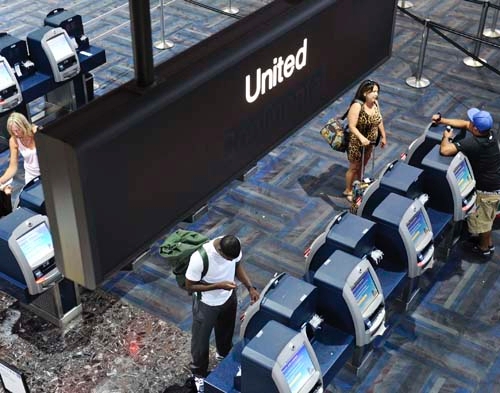With Southwest aboard, airfare hike expected to stick
Get ready to spend more on travel. Airlines are raising ticket prices again after a four-month lull that coincided with falling fuel costs.
Over the weekend, several big airlines matched United Airlines' increase in base fares of up to $10 per round trip within the U.S.
Fare watchers said it was virtually certain that the new prices would stick, resulting in the fourth fare increase this year and the first since late March.
United raised fares Friday by $4 to $10 per round trip, depending on flight length. Over the weekend, Delta Air Lines, American Airlines, US Airways, JetBlue and Virgin America all matched the move; so had Southwest Airlines and its AirTran subsidiary on flights of at least 500 miles. Southwest carries more passengers within the U.S. than anyone and is seen as a price-setter on many routes.
"Southwest participation virtually assures the hike will stick," said Rick Seaney, CEO of FareCompare.com.
J.P. Morgan analyst Jamie Baker said there could still be some tweaking as competitors respond to Southwest's decision to exempt short flights from the fare increase.
Just over half of Southwest's 1,549 flights a week out of McCarran International Airport head to cities in neighboring states or Reno, with about a third going to California. With 6.5 million passengers in the first five months of this year, Southwest has maintained its long-standing lead over competitors with a 38 percent market share.
With 1.6 million passengers, United holds the No. 2 spot at McCarran, although it has declined 6.3 percent from last year.
When airlines raise prices, not all passengers pay more. Airlines constantly promote sales, blunting the impact of the increases for sharp-eyed consumers who are willing to shop among carriers or fly on less-crowded days and off-hours.
The airlines raised domestic base fares nearly a dozen times last year, citing rising fuel prices, but they grew more cautious this spring as the economy weakened and jet fuel fell along with the decline in oil prices. From early April until late June, the spot-market price of jet fuel dropped 22 percent, but since then it has gained about 12 percent, according to government figures.
Airlines lost billions when fuel prices surged in 2008 and are trying to avoid a repeat. Hunter Keay, an analyst for Wolfe Trahan & Co., said the airlines should be able to pass along their higher costs like any industry.
"Consumers have gotten a bargain deal for the last 30 years on travel. They've become spoiled," Keay said. "On an absolute (adjusted-for-inflation) basis, airfares are still comically low."
Airlines for America, a trade group of the biggest U.S. carriers, said average fares would be 50 percent higher if they had kept pace with inflation since 1979. Since 2000, the group said, airfares including fees have increased 15 percent compared to increases of 65 to 135 percent for major league baseball games, eggs, gasoline and college tuition.
Besides raising fares, airlines are also bringing in more revenue from bag fees and other extra charges. IdeaWorks, a consulting firm specializing in loyalty programs, said in a report Monday that 50 of the world's airlines raised $22.6 billion last year from extra fees, which were practically nonexistent five years ago. The top three in revenue were U.S. carriers: United, Delta and American.
Airlines are able to raise prices even in a sluggish economy thanks in part to mergers that have eliminated two of the nation's seven largest carriers in the past four years. The survivors are dropping unprofitable routes and are cautious about adding new flights.
"They are taking supply offline," said Joel Wartgow, a senior director at corporate travel manager Carlson Wagonlit Travel. "There are just fewer options for the traveler - fewer flights, fewer seats available on those flights - and that allows them to drive up their prices."
Carlson Wagonlit forecast Monday that airline prices for corporate travelers in North America will rise 2.8 percent next year, a modest gain but noteworthy in a difficult economy.
Wartgow said companies can bargain with airlines over extra fees. He said corporate and leisure travelers should book early to get discounted prices, and vacationers should be flexible about travel dates.
Review-Journal writer Tim O'Reiley contributed to this report.






















